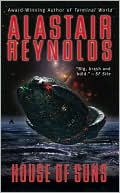House of Suns (2009)
Written by Alastiar Reynolds
Synopsis
Purslane and Campion, two of a thousand "shatterlings," or clones, who were engineered to survive the millenia involved in interstellar travel are of a small number who survive an attack on their "line." Working with the remaining survivors, they strive to uncover and punish the perpetrators but end up revealing something much deeper and more sinister.
MOster
I enjoyed this book very much. The story was interesting and compelling, and the ways Reynolds has evolved humanity into different types of creatures are innovative and thorough. The story kept me speculating, and while I figured out some of the high level points of the end before the characters, I did not expect the finale at all. The writing works well to bring the reader into the minds of the characters. I do have a small gripe with the structure of the book, but I think this is more of an editorial error than an authorial one. The way the story flows in the prequels which act as prologues for each of eight sections doesn't quite match the way it flows in the "present."
"House of Suns" differs from Reynolds's past works in that it's a smaller scope of characters operating in a much larger area both time and space. The approach allows for a self-contained novel rather than a four volume undertaking, and while he has only two main characters / narrators (who could be considered three... or one) rather than a dozen, each of the host of secondary players is given a distinct voice and personality. While it helps to filter through the eyes of another character, this is more difficult in written fiction than filmed fiction; and I appreciate that attention to detail.
I've read Reynolds's work in the past, and was quite excited to see that he brought a new story from a new universe (though the way his things work it could just be the same universe at a different point in history). Where he excelled in the past was in conveying the isolation and tedium of interstellar travel; and he does so to equal but different effect in this outing. The underlying elements of the universe have matured in that he has pushed to the background the deus ex machina crutch of immensely powerful found objects.
Taking into account that there are unexplainable items, this work blurs the line between true science fiction and "hard SF." The most important aspect here is in the rigid limit of the speed of light. Reyonlds discusses using magnetic fields, stasis devices, and similar theoretical technologies--it's important that they are all based in scientific *theories* of our age--to allow for (e.g.) acceleration in excess of a thousand G, but at the end of the day the ships just keep tacking 9s onto the end of .9c, allowing him to leverage relativity in interesting ways rather than just having people travel hundreds of billions of miles in a day and a half.
Reynolds has expanded the main volumes of the "Revelation Space" series into substories and prequels. I didn't read many of those because 1,500 pages of one universe is generally enough for me these days. But I'd love it if he took a similar approach to this universe. I would gladly pay another $9 to learn more about this newest world of his creation.


No comments:
Post a Comment